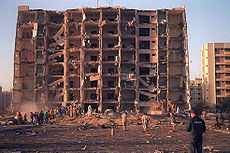United Nations Security Council Resolution 1373
| UN Security Council Resolution 1373 |
|
|---|---|

Aftermath of the Khobar Towers bombing, Saudi Arabia (1996)
|
|
| Date | 28 September 2001 |
| Meeting no. | 4,385 |
| Code | S/RES/1373 (Document) |
| Subject | Threats to international peace and security caused by terrorist acts |
|
Voting summary
|
15 voted for None voted against None abstained |
| Result | Adopted |
| Security Council composition | |
|
Permanent members
|
|
|
Non-permanent members
|
|
United Nations Security Council Resolution 1373, adopted unanimously on 28 September 2001, is a counter-terrorism measure passed following the 11 September terrorist attacks on the United States. The resolution was adopted under Chapter VII of the United Nations Charter, and is therefore binding on all UN member states.
It marks a shift in international law, as the latter was presumed to be valid only if the concerned state had voluntarily signed the international treaty; whereas here the Security Council imposed the resolution on all member states. According to the press release, the "meeting, which began at 10:50 pm, adjourned at 10:53 pm" and thus lasted three minutes. There is no record of the meeting, and although the United States is widely credited with initiating Resolution 1373, it is not known who really was responsible for its passage.
The resolution aimed to hinder terrorist groups in various ways. It recalled provisions from resolutions 1189 (1998), 1269 (1999) and 1368 (2001) concerning terrorism. UN member states were encouraged to share their intelligence on terrorist groups in order to assist in combating international terrorism. The resolution also calls on all states to adjust their national laws so that they can ratify all of the existing international conventions on terrorism. It stated that all States "should also ensure that terrorist acts are established as serious criminal offences in domestic laws and regulations and that the seriousness of such acts is duly reflected in sentences served."
The resolution established the Security Council's Counter Terrorism Committee [CTC]to monitor state compliance with is provisions.
It also aimed at restricting immigration law, stating that "before granting refugee status, all States should take appropriate measures to ensure that the asylum seekers had not planned, facilitated or participated in terrorist acts. Further, States should ensure that refugee status was not abused by the perpetrators, organizers or facilitators of terrorist acts, and that claims of political motivation were not recognized as grounds for refusing requests for the extradition of alleged terrorists."
...
Wikipedia
